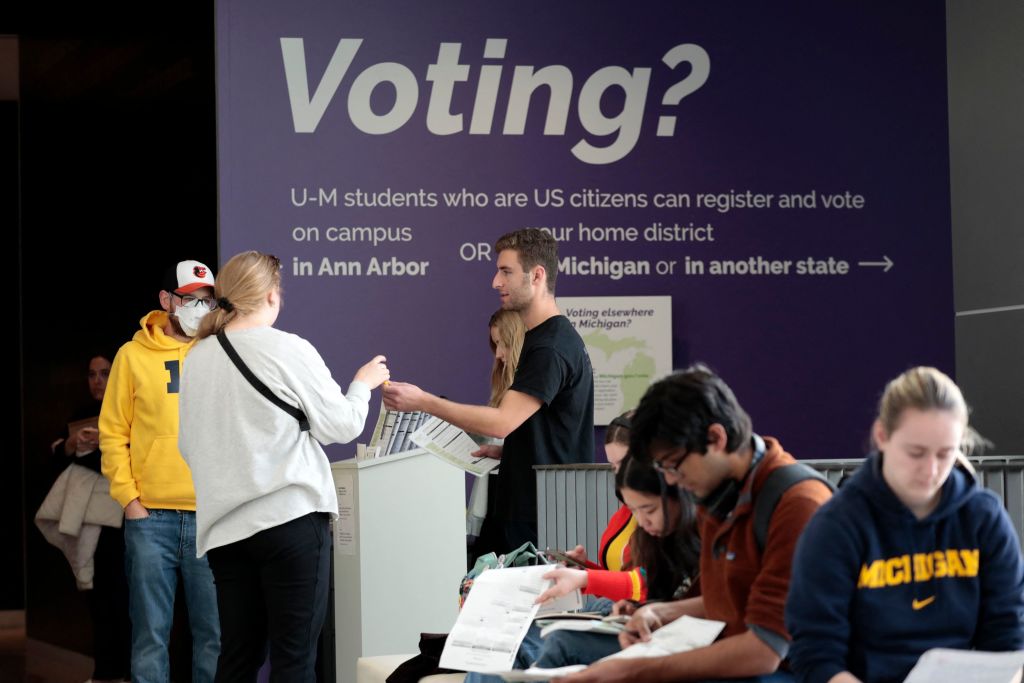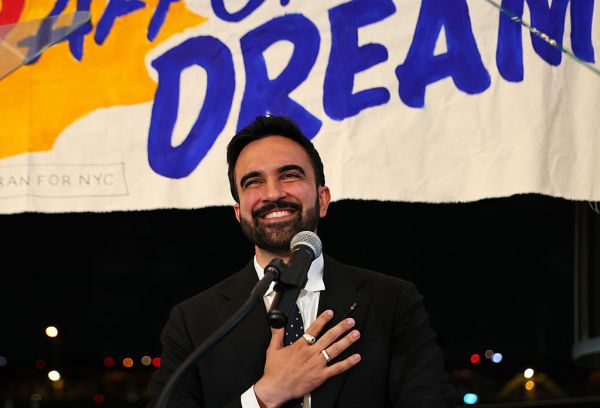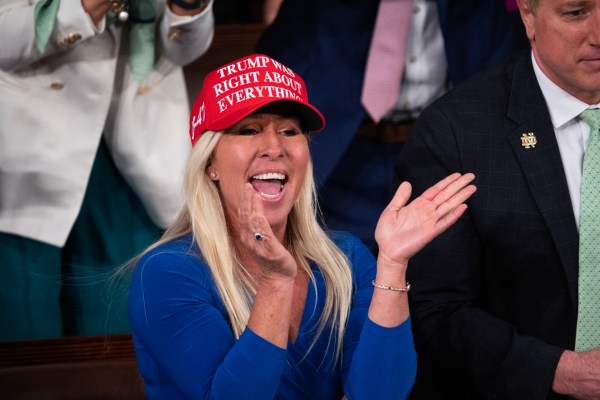Over the last four presidential elections, American voters under the age of 30 have backed Democrats by whopping margins. They voted for Barack Obama by 34 points in 2008 and by 23 points in 2012, and they voted against Donald Trump by 19 points in 2016 and by 24 points in 2020. So one of the more eye-popping polling patterns in the 2024 election cycle has been that Trump and Joe Biden are running surprisingly close among the 18- to 29-year-old demographic.
Back in the fall, the average of polls showed Biden leading Trump among that age cohort by just 4 points—46 percent to 42 percent—a dramatic underperformance for Biden from 2020, when he carried young voters 60 percent to 36 percent. Those results have prompted many think pieces examining whether the polls are accurate, and, if so, why Biden has suffered an outsized erosion among the youngest voters.
Now that the primaries are over and the general election is in full swing, those questions persist, but polling of younger voters conducted this spring has been more mixed. “The polling has been all over the map,” John Della Volpe, director of polling at Harvard’s Institute of Politics, told The Dispatch. “I think it’s been hard for the general public to get a sense of what’s happening. But my sense is not as much change is happening as we might think.”
For example, a March Fox News poll showing Trump leading Biden by 5 points overall found Trump leading Biden by an astonishing 46 percent to 25 percent among voters under 30—with the remaining votes mostly split among candidates Robert F. Kennedy Jr., Jill Stein, and Cornel West. A poll conducted by Quinnipiac that same month showing Biden leading Trump by 3 points overall in a one-on-one race found Biden carrying voters under the age of 35 by 20 points—56 percent to 36 percent—roughly in line with the 2020 results. When Quinnipiac offered third-party candidates as an option, Biden’s overall 3-point lead turned into a 1-point deficit, and his margin among young voters was slashed from 20 points to 9 points.
But it’s not quite so simple to say that Biden’s overall position depends on whether he is polling well among younger voters. The pollster YouGov conducted two separate surveys of registered voters for two different sponsors—The Economist and Yahoo—around the same time in March following the State of the Union Address. Each YouGov poll showed Trump with a 2-point lead overall, but YouGov’s Economist poll showed Biden holding a 27-point lead over Trump among voters under 30, while YouGov’s Yahoo! poll showed Biden holding a 15-point lead over Trump among that same group. Small subsamples of polls can have an especially wide margin of error, and that’s why it’s important to consider many polls.
“I think if you go out and look at everything in total … Biden has slightly less support than he did in 2020. Trump has slightly more support,” Della Volpe said. “There’s certainly a much higher incidence of people looking at independent candidates. So it’s just a much softer electorate right now.”
Even if Biden isn’t doing as poorly with young voters as his worst polling results suggested last fall, the problem is that “he can’t really afford any erosion from where he was in 2020,” David Wasserman of the Cook Political Report told The Dispatch. Biden won the national popular vote in 2020 by 4.5 percentage points, but his victory in the Electoral College was a nailbiter. He won Wisconsin, Arizona, and Georgia by less than 1 point and carried Pennsylvania by a little more than 1 point. If Biden were to win young voters by 14 points in 2024 instead of his 24-point margin from 2020—and everything else stayed the same—that could be enough to sink him in 2024. “My sense is that he’s ahead of Trump but not nearly by the margin that he would need to win again,” said Wasserman.
Several factors could be hurting Biden among the youngest voters. Based on conducting dozens of focus groups, Harvard’s Della Volpe has detected a significant difference between first-time voters in 2024 and those in their late 20s, who were old enough to vote in 2020 and 2016. “I don’t think Trump carries the same negative baggage with this youngest cohort as he does with older ones,” he said. First-time voters who are 18 or 19 years old now were in fifth or sixth grade when Trump was first elected, Della Volpe pointed out. So for them Trump has been the norm of American politics—the main character on the stage since they first became conscious of politics—rather than the norm-breaking interloper seen by their older peers.
Young voters, who have less income and fewer assets than older Americans, have been particularly hard-hit by inflation. “The cost of housing continues to become more out of reach,” Della Volpe said. “It’s extraordinarily stressful for them.” Meanwhile higher interest rates hurt those who carry credit card balances and are taking out new loans to buy cars. In February, Adam Carlson aggregated the polling subsamples for different demographic groups and found that while Biden had slipped by just 0.7 percentage points relative to his 2020 performance among voters earning more than $100,000 per year, his support had dropped by 11.4 points among voters earning less than $50,000.
Biden has also seen steep declines among his performance with minority voters, which also suggests Biden’s performance will drop among younger voters. “Millennials and Gen Z are simply much less white than [older] voters,” pollster Patrick Ruffini of Echelon Insights told The Dispatch, “and so to the extent you have movement among Latino and Asian voters in particular, that’s going to take a toll on younger voters.” As John Burn-Murdoch of the Financial Times observed last month, there’s evidence that younger African American voters are shifting toward Republicans. “If you’re over the age of 65, you have memories of the civil rights movement, or the direct aftermath,” Ruffini said. “The younger you go, the less that collective memory is something that guides your day- to-day political decision making.”
Biden’s biggest weakness overall—his age—is perhaps playing an outsized role in dragging him down among young voters. Polling has found generic Democrats substantially outperforming Biden among voters under 30. “Biden is a poor fit generationally for these voters—not necessarily just in terms of his age, but he kind of represents an old-school version of politics, a very insider establishment persona that would stand in contrast to someone like Bernie Sanders, let’s say, who did well among young voters, even though he was very old,” Ruffini said.
On Saturday afternoon, young adults who spoke to The Dispatch outside of the Philadelphia Phillies vs. Washington Nationals baseball game in Washington, D.C., were generally unenthusiastic about November’s election. “I would have voted for Biden four years ago if I could have,” Hanna Aggen, an 18-year-old from York, Pennsylvania, told The Dispatch. “I have decided that I will not be voting [in 2024] because I am very frustrated by who are the picks for this election. They’re very old, and neither of them has done a good job.”
“Is it still Trump and Biden?” replied Clyde Ngwa, a junior attending Albright College in Reading, Pennsylvania, when asked how he intends to vote in November. Ngwa said he was unsure how he’d vote because he’s busy with pre-med coursework: “I’m always studying. I don’t really follow politics that much.” Kassidy Moua, who also attends Albright College, told The Dispatch that the 2024 election is a choice between “the lesser of two evils. There’s no great candidate. … I’ve been looking into Robert Kennedy’s policies, and I think I’m leaning more towards him.”
Young voters who plan to back Trump generally cited Biden’s age and the Trump economy when explaining their decision. “I’m concerned about Biden’s health and a Kamala Harris presidency,” a 24-year-old Penn State graduate named Amy, who declined to share her last name, told The Dispatch. “I like [Trump’] economic policies,” said Katherine, a fellow 24-year-old Penn State alumna.
Much ink has also been spilled about how much Israel’s war against Hamas in Gaza is hurting Biden. “Among Biden’s 2020 voters in this age cohort, there’s broad opposition to the administration’s approach to the conflict,” the Cook Political Report’s Wasserman told The Dispatch. Out of more than a dozen young voters who spoke to The Dispatch on Saturday, only one cited the issue as a decisive reason to oppose Biden. “I might not vote,” Michael from Northern Virginia told The Dispatch. “Biden’s dishonest, and he needs to have a ceasefire [in Gaza], and Trump has shown racist tendencies. If there’s a ceasefire, I’d vote for BIden.”
Mike Gee, a Howard University graduate now in his 30s, stood outside of Nationals Park before the Phillies game on Saturday with a sign that read: “MOVE, BIDEN, GET OUT THE WAY! VOTE CORNEL WEST OR JILL STEIN 2024.” Gee, who launched the website onlyvoteprogressive.com, said the war in Gaza was just one reason to oppose the president. “Biden ran on tuition-free college—at least community college—forgiving student loan debt, kind of a health care for all plan, paid family-leave, paid sick-leave, universal childcare, expanding the Child Tax Credit, $15 minimum wage, robust climate change [measures]—I can go on and on. And he hasn’t delivered,” Gee said. If Biden loses, “we’ll start anew, all right, and maybe it’ll hurt for four years. Then we’ll come back and do it again in 2028.”
A key remaining question is just how much the candidacies of Robert F. Kennedy Jr., Jill Stein, and Cornel West hurt Biden. Daniel Cox, senior fellow in polling and public opinion at the American Enterprise Institute, still believes Biden will likely end up with a healthy margin among young voters. “Third party candidates always perform better in polls than they do on Election Day,” Cox told The Dispatch, because in the end people “view it as kind of throwing away your vote.” And the overall demographic profile of young voters—“fairly secular, well-educated and now increasingly liberal group”—makes it hard to see Trump making dramatic improvements. “It’s possible that they stay at home but I think it’s impossible that they’re going to split evenly between Trump and Biden,” Cox said. “I think I would not be surprised to see some amount of erosion, but I think it’s going to be marginal.”
But it’s entirely possible the size of that margin could very well prove decisive in November.







Please note that we at The Dispatch hold ourselves, our work, and our commenters to a higher standard than other places on the internet. We welcome comments that foster genuine debate or discussion—including comments critical of us or our work—but responses that include ad hominem attacks on fellow Dispatch members or are intended to stoke fear and anger may be moderated.
With your membership, you only have the ability to comment on The Morning Dispatch articles. Consider upgrading to join the conversation everywhere.